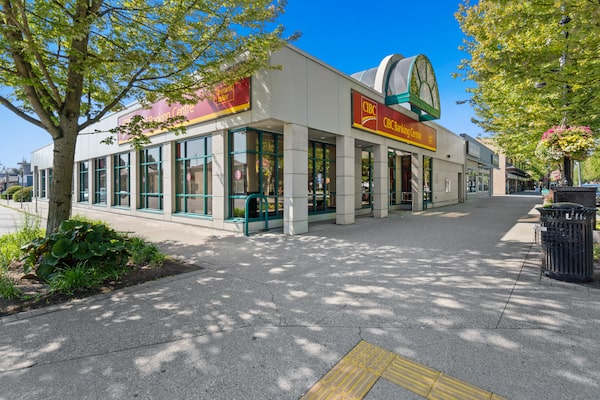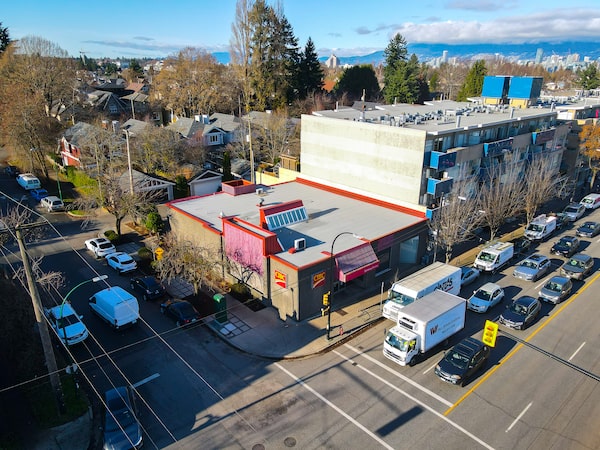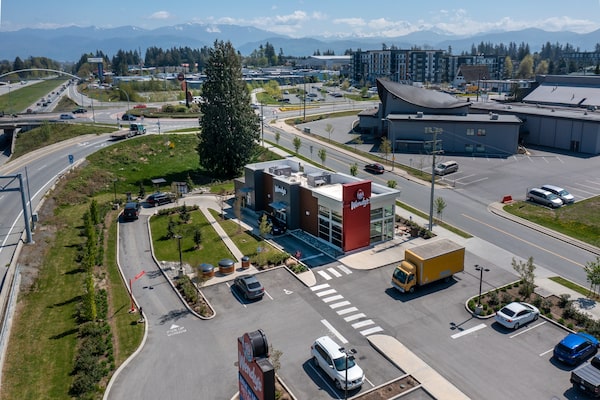
CIBC in Maple Ridge received multiple offers within the first week of coming to market. It sold to a private investor for $7.29-million.Marcus & Millichap
While some kinds of retail property have fared better than others during the pandemic, one retail type has proven a clear winner.
Stand-alone retail properties, occupied by a corporate client such as a major bank, grocery store or big pharmacy, “have always been a preferred asset for investors, but now we are seeing a notable increase in buyers searching for this type of property,” according to Curtis Leonhardt, vice-president, investments, at commercial real estate firm Marcus & Millichap in Vancouver.
The appeal, Mr. Leonhardt says, is the security and stability offered by the strong covenants and long, triple-net terms that commonly govern the leases of these properties.
Triple-net leases usually cover 10 to 20 years, with annual rent increases, or escalators, built in. The tenant is provided near-total autonomy of the property and pays not just rent and utilities, but three additional categories of property expenses: property tax, insurance and most maintenance costs, such as landscaping and snow removal.
“They are virtually a hands-off investment,” says Mr. Leonhardt, who specializes in the niche market. “In many cases, owners are literally just collecting a cheque.”

- Single-tenant retail property occupied by national clients offer stability and security for investors, say experts. This CIBC building on Vancouver’s Main Street is listed for $7.5- million.Marcus & Millichap
Last year, in British Columbia, Marcus & Millichap completed 23 single-tenant property transactions with a total volume of more than $104-million. The company’s previous three-year volume averaged $81-million.
Mr. Leonhardt notes that “demand for quality assets continues to outpace supply.” With investors keen to capitalize on low interest rates in anticipation of higher borrowing costs in the latter half of 2022, “bidding wars” are not uncommon.
For example, Marcus & Millichap listed a CIBC bank property in Maple Ridge, B.C. In the first week, the sale drew multiple offers, with the winning $7.29-million bid dealt by a local, private investor.
The cap rates are no different for single-tenant properties than they are for multitenant properties. And you don’t have the management headaches.
— Gordon Beattie, president, Intercity Properties Ltd.
And recently, in North Vancouver, Marcus & Millichap listed a block of newer commercial strata units occupied by national tenants, including Bank of Nova Scotia and Pharmasave drugstore. Each unit was secured by a triple-net lease; prices ranged from $1.4-million to $4.3-million. Within days of the properties going to market, a single buyer purchased the entire offering.
With lower listing prices than multitenant buildings, stand-alone retail properties are a strong draw for private investors, says Mike Grewal, vice-president at Colliers’s Surrey, B.C., office.
Challenged by the acute supply shortage of industrial property and intensive management required for residential investment, “a lot of investors are chasing these single-tenant retail buildings,” Mr. Grewal says.

National clients, such as Wendy's, commonly sign long-term, triple-net leases, which can lead to a carefree investment, say experts.Marcus & Millichap
A specialist in investment sales, Mr. Grewal speaks also from personal experience. As the owner of a couple of residential homes, he found the demands from the tenancy board so frustrating, he got to a point where he was “done with these investments.”
“So, I cashed out and now I’m looking for a commercial investment to plug my money into.”
According to CBRE, 2021 may turn out to be a record-breaking year for the number of “smaller commercial real estate” transactions. Figures are still being tallied, but the total is expected to reach 9,500 – surpassing the previous record by 2,000 transactions.
Canadian investors continue to be the most active buyer group, accounting for nearly half of all acquisitions. Foreign investors accounted for nearly 15 per cent.
Gordon Beattie, president of Surrey-based Intercity Properties Ltd., is a long-time investor in single-tenant retail properties. Since the mid-1970s, the chartered tax adviser has built a 40-building portfolio that extends from Ontario to British Columbia, of muffler shops, 7-Eleven and Mac’s convenience stores, Pizza Hut and KFC restaurants and other largely single-tenant properties.
Most recently, a Shoppers Drug Mart in Brandon fit the requirements he insists on when buying a single-tenant retail property.
“It’s like a points system,” explains Mr. Beattie, who is “constantly combing” commercial real estate websites in search of suitable properties. “I give points for location. Is it a corner? Is it in a populated centre?”
In the case of Shoppers Drug Mart, it is surrounded by seniors’ complexes and a regional hospital: It isn’t about to go out of business.
“Then there’s the tenancy,” he says. “Is it a national tenant? What are the terms? I look at the character of the building from an architectural standpoint. Does it have a degree of utility for subsequent tenants?”
A B.C.-based private investor recently purchased a Rexall-occupied building, in Stony Plain, Alta.Marcus & Millichap
A crucial score point is capitalization rate, “the basis for valuing these properties,” he says. “The cap rates are no different for single-tenant properties than they are for multitenant properties. And you don’t have the management headaches. If [tenants] run their business to be successful, they make sure their building is well maintained.”
While Mr. Beattie owns properties on several main streets, such as Yonge Street in Toronto and Granville Street in Vancouver, he also favours secondary markets – “the Cranbrooks and the Kamloops of the world: There’s less competition and you can get better cap rates.”
Smaller markets are riskier, though. “It might be more difficult to maintain the rental value if you lose the tenant.”
Mr. Beattie maintains that land-value speculation isn’t a key factor in his purchasing rating system.
But in Metro Vancouver’s constricted market, Colliers’s Mr. Grewal says, many single-tenant retail property buyers are “speculating on the continuing increase of land value.”
It’s a bonus, he notes. The finale of a carefree, income-generating investment in a bank or drugstore building “could potentially be an up-zoning for higher-density development” – followed, most assuredly, by the sale of it. As he puts it, “who needs the headache?”
The rise of retail investment
Thanks largely to whopping sales of industrial and multifamily properties, commercial real estate investment in Canada has reached historic highs. But retail property investment across the country has also increased compared to pre-COVID-19 levels, according to the following CBRE statistics from January-September, 2021:
- 30 per cent: increase of retail property investment in Canada since pandemic
- 70 per cent: increase in industrial real estate
- 90 per cent: increase in multifamily real estate